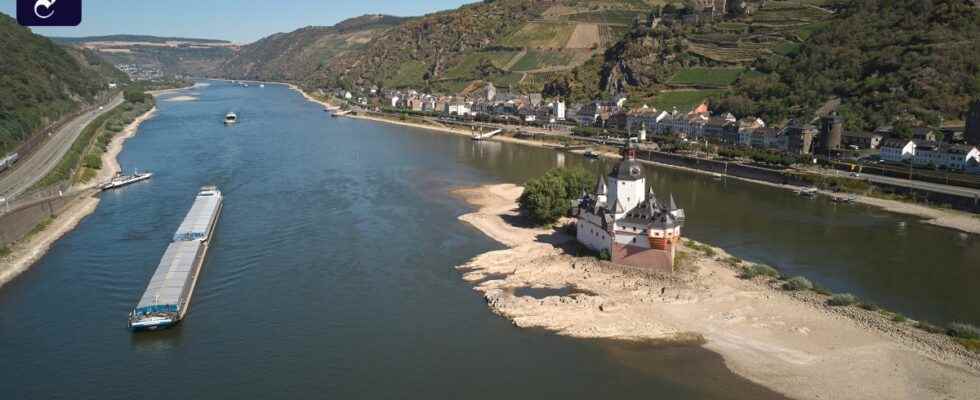NAfter days of record-low water levels on Germany’s most important waterway, the Rhine, there are signs of relaxation. “Within the next few days, the water levels will rise again in the entire Rhine catchment area due to the announced precipitation,” said the Rhine Waterways and Shipping Office on Wednesday. The 14-day forecast indicates that water levels will “rise by 50 centimeters and more” by the end of next week. However, the office does not give the all-clear, as the water levels “subside again after the wave has passed”. The water levels on the Middle and Lower Rhine are currently at an exceptionally low level for this time of year. “They are the result of the lack of rainfall in recent weeks and months,” it said.
The water level on the Lower Rhine had previously fallen below zero in Emmerich. During the measurement on Wednesday morning at 5 a.m., the record low of minus two centimeters was measured, as the Waterways and Shipping Administration (WSV) announced via the Elwis portal. Despite the exceptional situation, shipping was still possible until the very end: The water level is not synonymous with the fairway depth, which is decisive for shipping. This was recently just under two meters in Emmerich.
Damaged ship towed free
In addition to the low tide, a cargo ship that was stranded had meanwhile impeded shipping traffic on the Rhine and caused a temporary closure. The 190 meter long and almost 23 meter wide cargo ship has been blocking the fairway between St. Goar and Oberwesel in Rhineland-Palatinate since Wednesday night after a machine failure. The push boat with three lighters was traveling up the river, initially no ship could pass the bottleneck, as a spokesman for the water police said.
In the course of the morning the ship was finally towed away. A spokesman for the water police said it was brought from the scene of the accident to Bingen. Shipping was to be reopened upriver by midday. According to the spokesman, it should be “easily 2 p.m.” by the time ships can go down the Rhine again. The background to this is that ships are only allowed to travel upstream again when the pushed convoy loaded with 1660 tons has been brought to Bingen with the help of two other ships. According to the spokesman, an earlier release of oncoming shipping would be too risky given the low water level and the high water displacement of the ships.
It was initially unclear whether the accident on the cargo ship had anything to do with the low water. It is conceivable that there are problems with the screws, the spokesman said. Divers should clarify this when the ship has arrived in Bingen.
Federal Transport Minister Volker Wissing is concerned about the overall situation. “We are in a situation in which the infrastructure is extremely challenged,” said the FDP politician on ARD. When asked whether this could lead to short-time work or similar serious consequences, he replied: “I hope not”. In recent decades, too little has been invested in the infrastructure – for example in the Rhine deepening, with which inland navigation can be kept running even when the water level is very low. “We’re going to do that now,” said Wissing.
Wissing: Passenger trains can sometimes have to wait
He also defended plans to prioritize coal shipments by rail. If there are shortages, as is currently the case, “then that means that you have to let the most important things go first”. “That means: priority for the most important transports – and this includes, for example, coal transports.” A regulation is planned that will enable corresponding prioritization.
This could lead to even more jerking in the already tense passenger traffic on the rails. “If it should happen that we have to activate the prioritization of coal transports, then it can happen that a passenger train also has to wait at the end,” said Wissing. “Because supplying the power plants has priority. Nothing works without a stable power supply.”
German industry is warning of the devastating consequences for the economy in view of the record low water levels on the Rhine. “The persistent dry period and the low water threaten the security of supply for industry,” said the deputy general manager of the Federation of German Industries (BDI), Holger Loesch. “Companies are preparing for the worst. The already tense economic situation in the companies is getting worse.” It is only a matter of time before plants in the chemical or steel industry are shut down, mineral oils and building materials do not reach their destination or large-capacity and heavy transports are no longer possible. Delivery bottlenecks, production cutbacks or even standstills and short-time work would be the result.
